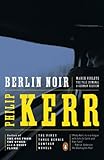5 CommentsReply |
MenuLatest GadetsRecent Reviews
Archives
|
Notcot
Gizmos, Gadgets, Noir and Steampunk
5 CommentsReply |
|
Copyright © 2025 Notcot All rights reserved. Theme by Laptop Geek. Site by I Want This Website. | Privacy Policy.

In the light of the above reviews I approached this book with some anticipation. What a disappointment! Badly written, cliche-ridden, vacuous characterisation, formulaic stories. Chandler transposed from Chicago to Berlin but without the style and originality.
The most irritating thing about the book is the way in which the author constantly feels the need to explain the contemporary references to Nazi Germany. “The DAF? Ah, you mean the German Labour Front!”
“Dr.Goebbels, the Minister for Propaganda and Popular Enlightenment, I presume?”
Total junk!
Rating: 1 / 5
I thought the premise of this book was very interesting – a private detective operating in Germany while the country descended into the moral corruption and madness of the Nazis. Let the dark psychological drama unfold. What follows is quite frankly a let down. The hero is one-dimensional, as are all the other characters. There’s no real evocation of place. The plot is simply a 1940s-style crime caper transposed to pre-war Germany. While the action takes place in Berlin and therefore all the geography is German, it simply doesn’t feel real. Kerr’s writing is okay but nothing special. Do yourself a favour and read Raymond Chandler or Chester Himes instead.
Rating: 2 / 5
The idea sounds brilliant: a private eye investigating crimes set against the Nazi dictatorship of the 1930s and 40s. Unfortunately, and despite the recommendations from Salman Rushdie on the cover and further thumbs up on the back from respectable newspapers, I found this trilogy of novels very disappointing, and have to admit I gave up half-way through the second one. As hard-boiled detective fiction in the tradition of Hammet and Chandler, its only original contribution are the settings in Third Reich Berlin and postwar Vienna. Otherwise Kerr mainly takes his inspiration from familiar plots and situations, while trying to capture the tone of a classic hard-boiled novel to the point of parody. The initial meeting between the detective and his client in MARCH VIOLETS seems straight out of BIG SLEEP. As for the authenticity of the German settings: Kerr does get some of the basics right (geography, street names, political events and figures), but on the whole, for anyone even vaguely familiar with German culture, society, and everyday life, it just doesn’t ring true. It’s not just minor but still jarring details, such as misspelled names, or incongruities such as the detective eating Quaker Flakes for breakfast. The whole atmosphere, mentality, and interaction between characters feels out of place and out of time. Some of it is almost unintentionally funny. The main protagonist, allegedly a German WWI veteran, sounds and behaves as if he’s had a personality transplant from a 1930s Chicago or late 1940s LA gumshoe (referring to Goebbels as Joey???), while the villains seem to have stepped right out of a Bogart picture. Then there are the instances where the dialogue in sledgehammer fashion plays on readers’ historical hindsight, e.g. the Jewish pawnbroker musing “when will the Nazis ban Jews from breathing oxygen”. I suppose this was meant to be a meaningful reference to the Holocaust, but it feels just clunky and off-target, like most of the author’s attempts to be ‘serious’.
Rating: 2 / 5
Is this a clever sub-genre of the thriller, or just a ho-hum exercise in an unusual setting? I think it’s probably the latter. Berlin Noir is three novels under one cover and, while they vary somewhat in overall quality, the strengths and weaknesses are much the same.
The setting of place and time (mainly 1930s or 1940s Berlin) is interesting, but for me under-used. Occasionally, insights are offered into the way life had to be conducted; what was permissible, how things got done under the cloak of a fascist regime, the degree of accommodation with the Nazis. I would have liked to see more of this. Much more. Really good crime fiction generally allows the place and time to seep into everything and, more importantly, to matter. Could Marlowe, for example, really be anywhere else but Los Angeles? Unfortunately here, bar the intermittent references, and the frequent mentioning of street names as a proxy for genuine atmosphere, this was lacking.
As to Gunther himself; well, not enough of a hinterland for me. He has the basic requirement; of a moral code underneath apparent disinterest. In this respect, Kerr follows the private-eye rules. But I found his ability to routinely meet the upper echelons of the Reich, the seemingly continuous stream of women who just can’t wait to sleep with him, lazy and ineffective. This means that all of Gunther’s relationships are cartoon-like – drawn in big pictures that we can easily follow, but lacking any subtlety.
Overall, once the novelty of a book set in Nazi Germany wore off, this series became progressively more dull. Setting a book in this place and era was imaginative; what followed was strictly by the numbers.
Rating: 2 / 5
Having seen an article about this author in The Word I went and ordered Berlin Noir and I was not disappointed. Philip Kerr has a great feel for both hard boiled detectives in the Chandler/Hammett vein and also historical setting. I learned a lot about what was happening in Germany just before, during and after the Second World War. His characters are well drawn, and his dialogue as fresh and as rich as Raymond Chandler’s and yet of its time. Definitely well worth the price, I recommended it unreservedly. I will be buying more of his work in the future.
Rating: 5 / 5